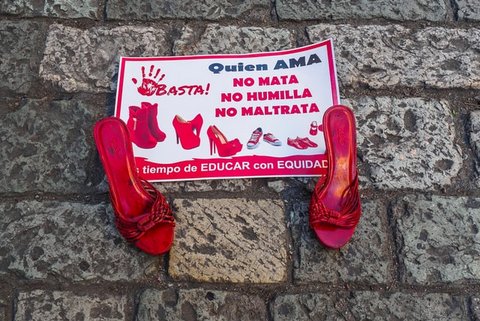
26 Sep Immigrant Domestic Violence Survivors Face Shrinking Protections
By Selen Ozturk
American Community Media
Amid slashed funding and weakened legal protections, immigrant survivors of domestic violence face mounting new barriers to safety.
Survivors applying for U visas, given to victims of violent crime, or Violence Against Women Act relief — which allows petitioning for immigration status to separate from an abusive partner — now face scrutiny from immigration enforcement and stricter, interview-based application vetting.
New anti-DEI restrictions have also been enforced for many key domestic violence organizations receiving grant funding from federal agencies, including the Office of Violence Against Women and the Department of Housing and Urban Development, which implements housing protections for survivors.
Early this month, Attorney General Pam Bondi also issued a decision in two pending cases — Matter of S-S-F-M- and Matter of R-E-R-M- & J-D-R-M- — reviving major restrictions on gender-based asylum claims under the first Trump administration that the Biden administration had rolled back.
Meanwhile, the ongoing threat of Immigration and Customs Enforcement raids nationwide has created an overwhelming climate of fear, leading many immigrant survivors to avoid reporting their abuse or seeking help at all.
‘The silence is not safety’
“After the ICE raids began, complaints of discrimination and hate dropped in L.A. County by about one-third — not because incidents were down, but because people were afraid to report them. And now we see a similar pattern with reporting domestic violence,” said Carmen McDonald, executive director of the LA-based Survivor Justice Center, at a Sept. 12 American Community Media briefing.
“We’ve lost complete contact with one of our clients. She asked us to cancel her restraining order and to close her case with our office, and we cannot locate her,” she continued. “We have had clients tell us they’re skipping critical medical appointments. One client didn’t want to go to a dialysis appointment that was located near a Home Depot … They don’t want to go on public transport. They don’t want to go to the DMV to renew an ID card … The silence is not safety; it’s danger.”
>>>Teen Talk:
I Went Back to L.A. After the ICE Raids. One of My Favorite Areas Felt Like a Ghost Town<<<
Although SJC has since moved many of its in-person clinics and meetings online, McDonald said many of her clients, of whom 70% are immigrants, “are afraid to even report to law enforcement unrelated issues. We’ve had a client who was in a car accident that didn’t want the police to come. Another person told us they were pulled over and wanted to say at that moment to the police, ‘My abuser has sexually assaulted me and has weapons at home,’ but was afraid to continue any interaction with the officer.”
Juana Padilla, a client who sought help from SJC in this climate of fear and received a green card and medical treatment for her child through a VAWA self-petition, urged other survivors not to stay silent.
“I was afraid to ask, to even say that I was abused,” she said. “Especially when your husband is an ex-military, they put in your head that you have no one … since I have no family here in the country, I went back to Mexico for six years. I took my kids, and I came back here because he could have had my kids, and I have the opportunity to start all over. And that’s when I found them. They gave me all the tools right away.”
“I have a little one that was born in Mexico, and they helped me with her,” Padilla added. “She has a condition that needs to be treated, and my fear was that if I don’t get my status here … with this administration, I was afraid that they’re gonna send me back, and my little one is not gonna get treatment. But thank God, we got it. They made a miracle.”
‘Roadblocks to relief’
Patima Komolamit, executive director of Center for the Pacific Asian Family, said that federal DEI funding cuts to gender-based violence nonprofits like hers, however, are making it harder than ever to providing this support.
Alongside a multilingual crisis hotline, CPAF operates an emergency shelter program, two transitional shelter programs, a youth prevention program and crisis intervention services in L.A.
“We have to not only contend with limited funding, but also the trauma and … vulnerability that immigrant survivors face because of their limited English proficiency, their lack of employment history within the U.S. and oftentimes the exploitative use of immigration status as a means to further abuse both the survivors and their children,” Komolamit explained.
Morgan Weibel, director of client advocacy and legal services at the national nonprofit Tahirih Justice Center, said that recently heightened federal requirements for U visa and VAWA application have only worsened this vulnerability.
“The entire premise of these visas was to create safety for survivors to come forward, report and cooperate in the prosecution of those violent crimes,” she added. “But the administration continues to erode that sense of safety right now by insisting that all law enforcement carry out immigration actions.”
“Early on in the administration, they eliminated previous guidance that exempted survivors from enforcement actions, so now a VAWA applicant, and even someone with an approved VAWA application, can be detained and deported,” Weibel continued.
“They also changed the process of what happens when a VAWA or U visa is denied. Previously, the person was just left without any status, but now the administration is placing those individuals into removal proceedings where they have to go before a judge to defend against deportation,” she said. “These are life-and-death stakes, as women and families will be deported to countries where they face grave risks, including femicide and homicide.”
As one solution, TJC has urged Congress to legislate a sixth ground for asylum that is based on gender “so that the fate of survivors’ cases are not left to the political leanings of those in power or determined by the place where they file their asylum application,” she explained. “But we also need police to provide public safety and not immigration enforcement so survivors can continue to access the protections available to them under U.S. law.”
“As the government creates roadblocks to relief, survivors are questioning whether it is worth it to even pursue the relief that is still owed to them under our laws,” she added. “None of us are safe until all of us are safe.”
Domestic violence support and resources are available 24/7, confidentially, through the National Domestic Violence Hotline over call, text, and online chat.






No Comments